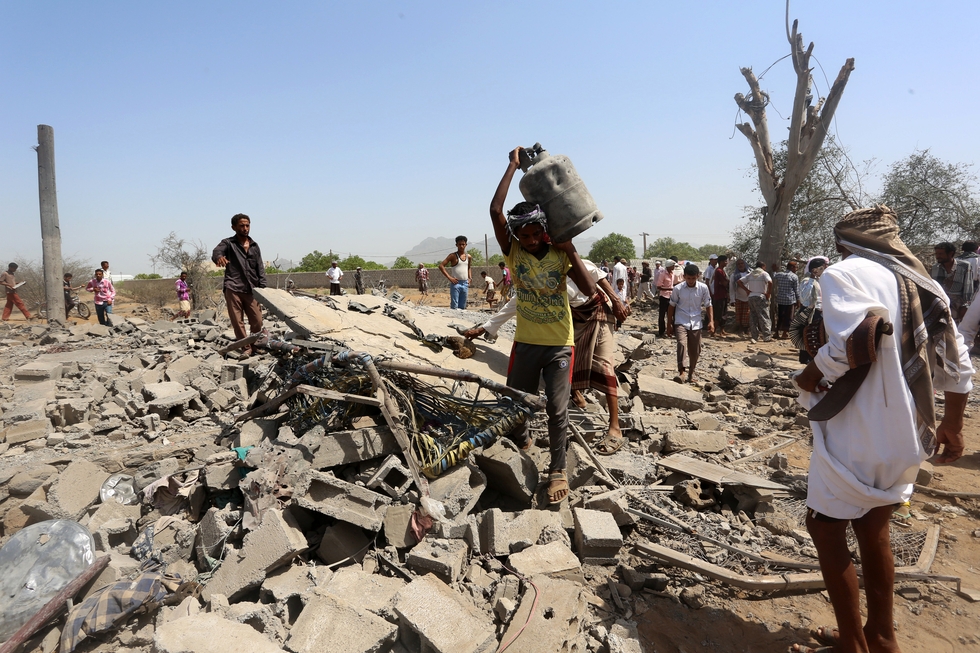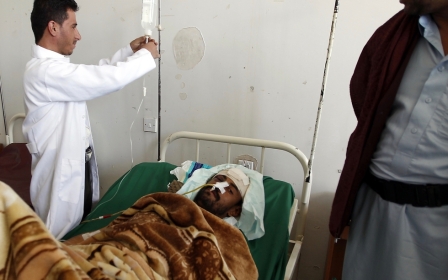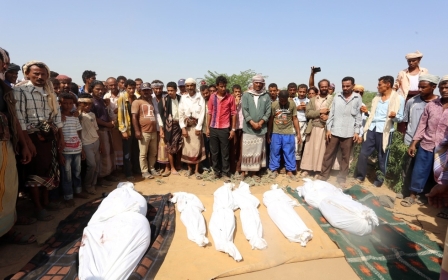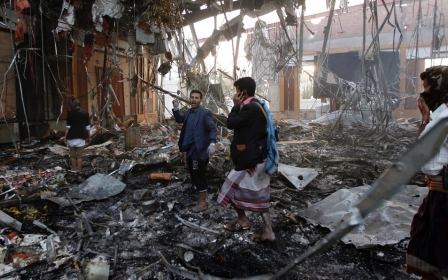US signed deal with Saudi despite official warnings of war crimes

The US government went ahead with a $1.3billion arms sales to Saudi Arabia despite warnings from officials that the US could be implicated in war crimes for supporting the Saudi-led air campaign in Yemen.
In documents released to Reuters, US State Department officials also expressed skepticism that it would be possible for Saudi-led forces to target the Houthi rebels without incurring civilian casualties.
According to the emails, other records obtained by Reuters and interviews with nearly a dozen officials with knowledge of those discussions, US government lawyers ultimately did not reach a conclusion on whether the country's support for the Yemen campaign would make the United States a "co-belligerent" in the war under international law.
If found to be the case, Washington would be obligated to investigate any allegations of war crimes in the impoverished Arab country and would have raised a legal risk that US military officers could be subject to prosecution.
State Department lawyers allegedly "had their hair on fire" as reports of civilian casualties in Yemen multiplied in 2015.
During an October 2015 meeting with private human rights groups, a State Department specialist on protecting civilians in conflict acknowledged that strikes from the Saudi-led intervention were causing indiscriminate damage.
"The strikes are not intentionally indiscriminate but rather result from a lack of Saudi experience with dropping munitions and firing missiles," said the specialist, according to a State Department account of the meeting.
"The lack of Saudi experience is compounded by the asymmetric situation on the ground where enemy militants are not wearing uniforms and are mixed with civilian populations. Weak intelligence likely further compounds the problem."
Despite these concerns, since March 2015 the US has authorised over $22.2 billion in weapons sales to Riyadh, much of it yet to be delivered, including a $1.29 billion sale of precision munitions announced in November specifically intended to replenish stocks used in Yemen.
The revelations come as anger continues to mount over an air strike carried out by the Saudi-led coalition on a funeral hall in Sanaa that left 140 people dead last week.
Thousands of angry protesters took to the streets of Sanaa on Sunday, chanting slogans against Saudi Arabia and the United States.
The foreign ministry of Iran, which supports the Houthis, denounced the attack as a "crime against humanity".
Following the attack, the US warned that its support tfor Saudi was not a "blank cheque" and said it had already "significantly reduced" support to the anti-Houthi forces.
"In light of this and other recent incidents, we have initiated an immediate review of our already significantly reduced support to the Saudi-led coalition and are prepared to adjust our support so as to better align with US principles, values and interests, including achieving an immediate and durable end to Yemen's tragic conflict," said a statement released by the State Department.
The Saudi-led coalition has come under increasing international scrutiny over civilian deaths.
In September 2015, a suspected coalition strike killed at least 131 civilians at a wedding near the Red Sea city of Mokha. The alliance denied any involvement.
And in March this year, Saudi-led air raids on a market killed at least 119 people, including 106 civilians, of which 24 were children, in the northern rebel-held province of Hajja.
In an initial statement to AFP, the coalition said it had no operations at the location.
The coalition "has in the past avoided such gatherings and (they) have never been a subject of targeting," it said.
In its latest statement, however, the coalition expressed its "deepest condolences and support to the families of the victims of hostilities since the coup takeover of power in Yemen during 2014".
In August, the US military said it had slashed the number of intelligence advisers supporting the coalition following concerns over civilian casualties.
The Houthis swept into Sanaa in September 2014 and advanced across much of Yemen, forcing the internationally recognised government of President Abd Rabbuh Mansour Hadi to flee.
Saturday's strike destroys the chance of reaching a truce and reigniting the peace process, said April Longley Alley, a Yemen specialist at International Crisis Group. The Houthis fired a Scud missile deep into Saudi Arabia at the weekend, apparently in response to the Sanaa attack, which killed the governor of Sanaa and injured senior Houthi officials.
New MEE newsletter: Jerusalem Dispatch
Sign up to get the latest insights and analysis on Israel-Palestine, alongside Turkey Unpacked and other MEE newsletters
Middle East Eye delivers independent and unrivalled coverage and analysis of the Middle East, North Africa and beyond. To learn more about republishing this content and the associated fees, please fill out this form. More about MEE can be found here.




